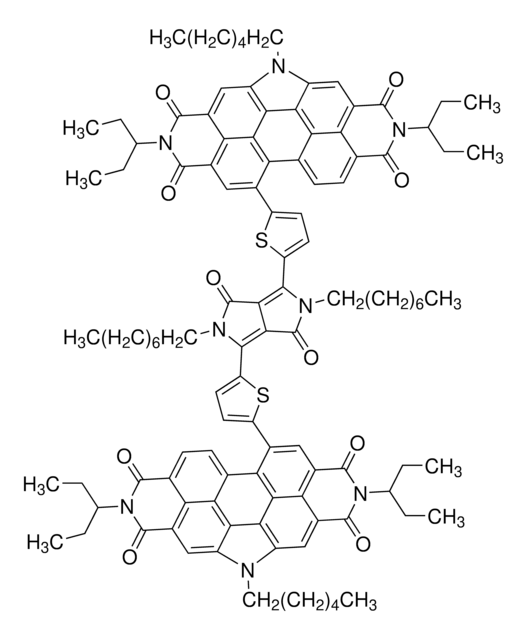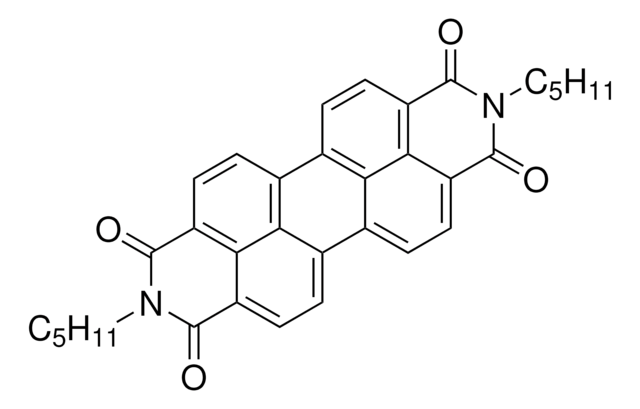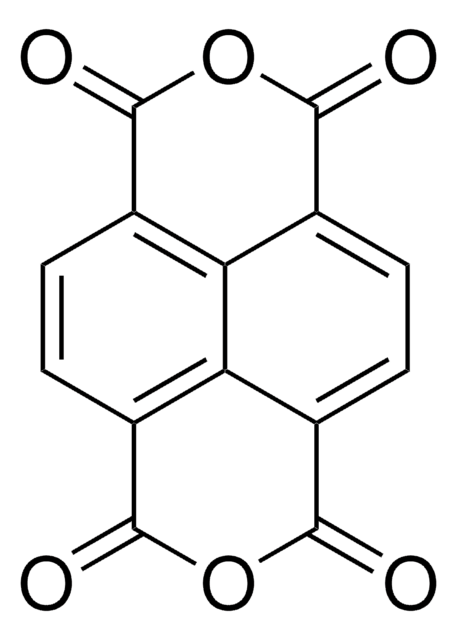932353
PTCDI
Synonyme(s) :
3,4,9,10-Perylenetetracarboxylic acid diimide
Se connecterpour consulter vos tarifs contractuels et ceux de votre entreprise/organisme
About This Item
Formule empirique (notation de Hill):
C24H10N2O4
Numéro CAS:
Poids moléculaire :
390.35
Numéro MDL:
Code UNSPSC :
12352302
Nomenclature NACRES :
NA.23
Produits recommandés
Catégories apparentées
Application
This TADF emitter is a sublimed high purity material, solution processable 3,4,9,10-perylenetetracarboxylic diimide has been reported for use in:
- photovoltaics
- thermoelectricity (induced by the Soret effect )
- batteries for energy storage
- photocatalysis for water purification or selective solar fuel production from CO2
- chemosensing
Mention d'avertissement
Warning
Mentions de danger
Conseils de prudence
Classification des risques
STOT RE 2
Code de la classe de stockage
11 - Combustible Solids
Classe de danger pour l'eau (WGK)
WGK 3
Point d'éclair (°F)
Not applicable
Point d'éclair (°C)
Not applicable
Faites votre choix parmi les versions les plus récentes :
Certificats d'analyse (COA)
Lot/Batch Number
Vous ne trouvez pas la bonne version ?
Si vous avez besoin d'une version particulière, vous pouvez rechercher un certificat spécifique par le numéro de lot.
Déjà en possession de ce produit ?
Retrouvez la documentation relative aux produits que vous avez récemment achetés dans la Bibliothèque de documents.
Ping Chen et al.
Environmental science & technology, 53(3), 1564-1575 (2019-01-04)
This study describes a promising sunlight-driven photocatalyst for the treatment of ofloxacin and other fluoroquinolone antibiotics in water and wastewater. Perylene diimide (PDI) supramolecular nanofibers, which absorb a broad spectrum of sunlight, were prepared via a facile acidification polymerization protocol.
Fully Solution-Processed Small Molecule Semitransparent Solar Cells: Optimization of Transparent Cathode Architecture and Four Absorbing Layers
J.Min et al.
Advanced Functional Materials
, 26, 4543-4550 (2016)
Qinglin Jiang et al.
Advanced materials (Deerfield Beach, Fla.), 32(45), e2002752-e2002752 (2020-09-15)
Low-cost, non-toxic, abundant organic thermoelectric materials are currently under investigation for use as potential alternatives for the production of electricity from waste heat. While organic conductors reach electrical conductivities as high as their inorganic counterparts, they suffer from an overall
Mengmeng Sun et al.
Chemical Society reviews, 45(6), 1513-1528 (2016-01-23)
Water-soluble perylenediimides (PDIs) with high fluorescence intensity, photostability and biocompatibility have been successfully prepared and applied in the biological field. In this tutorial review, we briefly focus on the synthetic strategies for the preparation of water-soluble PDIs by incorporating ionic
Shu Wang et al.
ACS nano, 14(5), 5998-6006 (2020-05-10)
The visual aesthetic that involves color, brightness, and glossiness is of great importance for building integrated photovoltaics. Semitransparent organic solar cells (ST-OSCs) are thus considered as the most promising candidate due to their superiority in transparency and efficiency. However, the
Notre équipe de scientifiques dispose d'une expérience dans tous les secteurs de la recherche, notamment en sciences de la vie, science des matériaux, synthèse chimique, chromatographie, analyse et dans de nombreux autres domaines..
Contacter notre Service technique








![N,N′-Bis[2-(2-tert-butyldimethylsilyloxyethoxy)ethyl]-3,4,9,10-perylenetetracarboxylic diimide 97%](/deepweb/assets/sigmaaldrich/product/structures/334/047/4ac691aa-ae25-4df1-9e0d-09ed12cb8f1f/640/4ac691aa-ae25-4df1-9e0d-09ed12cb8f1f.png)
